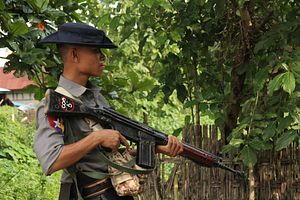On Monday, Myanmar’s government designated the Arakan Army as a terrorist and unlawful group. While the move came as little surprise, it nonetheless put the focus on Naypyidaw’s approach to the group and the situation in Rakhine state amid wider developments in the country’s politics and security.
Governance in Myanmar remains a complex and contested affair, with the National League for Democracy (NLD) ruling the country but a series of ethnic groups engaged in conflict with the government amid a fledgling peace process. Among these groups in the Arakan Army (AA), which has emerged as a group for Rakhine Buddhists seeking greater self-governance amid wider developments including the Rohingya crisis, tensions between Aung San Suu Kyi and Rakhine leaders, and the emergence of the Arakan Rohingya Salvation Army.
Since 2019, the AA has and has been engaged in heightened clashes with the military since 2019 which has killed dozens and left an estimated 140,000 people displaced. And as this has occurred, we have seen Naypyidaw turn increasingly to punitive measures, with a case in point being Suu Kyi’s labeling of the AA as a terrorist group back in January 2019 and intensified security operations targeted at it as well.
This week, Myanmar government’s approach to the AA was in the spotlight again with Naypyidaw designating it an unlawful terrorist group. The Myanmar government declared the ethnic armed group to be a terrorist group and unlawful association on Monday, arguing that the AA’s actions pose a threat to the public and the broader peace and stability of the country.
According to orders signed by Minister of Home Affairs Soe Htut, who also serves as chairman of the Central Committee for Counterterrorism, the AA, along with its political wing the United League of Arakan (ULA) and other affiliated groups and individuals, have been declared a terrorist and unlawful group under Section 15 of the Unlawful Associations Act for a range of reasons, including fears and threats to local people; organized attacks against Myanmar security forces; and the danger to law and order and peace and stability.
The designation comes as little surprise. As noted previously, the AA had earlier been called a terrorist group by the government and treated as such in some cases, even though it had not been formally designated as such. Indeed, the AA’s own statement in response to the designation also reflected a lack of surprise and continuity with its previous rhetoric, recalling the government’s lack of commitment to resolve problems and citing the fact that the group’s true legitimacy lied in its support among the people of Rakhine State.
Nonetheless, the designation is not without significance. It illustrates the growing reliance of the Myanmar government on punitive measures as hopes dim on other fronts and the AA’s attacks on the government continue, which aligns it more with the Tatmadaw’s preference for a military-focused approach. And as evidenced by the fighting that broke out hours after the designation, it further increases the likelihood that tensions between the AA and the government will escalate in the foreseeable future in Rakhine State and dampens the already diminishing hopes for any sort of end to conflict.
How exactly all of this play out will become clearer in the coming weeks, particularly as we see actions being taken by the AA in response, the government reaction, and the effects on ordinary people caught in the crossfire as well. These dynamics will also be playing out amid wider political and security developments in the country as Myanmar deals with other ethnic armed groups, inches towards elections expected later this year, and contends with the coronavirus, with the country finally officially recording its first cases this week amid anxieties about potential pressures on the health system. Nonetheless, the AA designation will be one important storyline to watch amid this broader context.

































